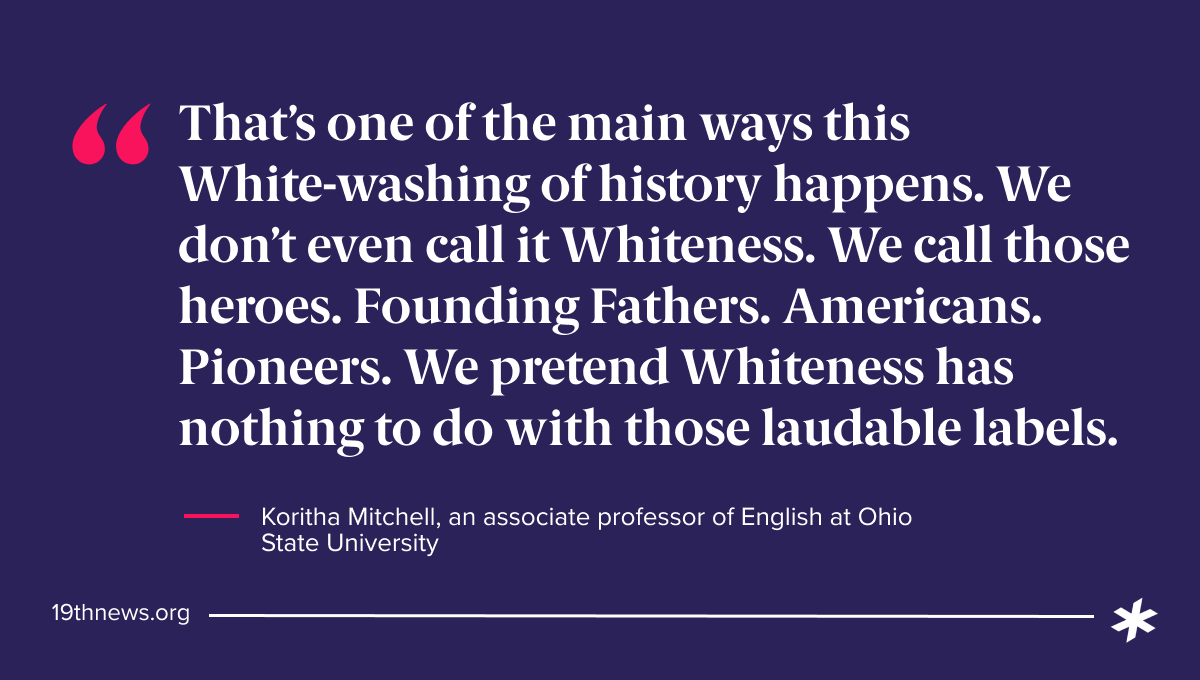🧵 Republican lawmakers in at least five states have introduced legislation that threatens to cut funding to schools that share curriculum about the award-winning 1619 Project.
It previews new battles in states over control of civics education. bit.ly/36Sxg5x
It previews new battles in states over control of civics education. bit.ly/36Sxg5x
The #1619Project was first published in The New York Times Magazine in August 2019, marking the 400th anniversary of the beginning of American slavery. nytimes.com/interactive/20…
The project includes audio, essays, poems and visual art that reframes the legacy of slavery in contemporary American life, arguing that Black Americans are the foundation of U.S. democracy.
It's creator, @nhannahjones, won the Pulitzer Prize for commentary for the project.
It's creator, @nhannahjones, won the Pulitzer Prize for commentary for the project.
The @pulitzercenter, in partnership with the 1619 Project, has made available related lesson planning and says more than 4,000 educators from all 50 states have reported using its resources. pulitzercenter.org/projects/1619-…
Lawmakers in Arkansas, Iowa, Mississippi, Missouri and South Dakota want to stop lesson plans that focus on the centrality of slavery to American history as presented in the #1619Project. bit.ly/36Sxg5x
Some historians say the bills are part of a larger effort by Republicans to downplay the ugly legacy of slavery and the contributions of Black people, Native Americans, women and others present during the nation's founding. bit.ly/36Sxg5x
Political battles have long been fought, largely in education boards, over how American students learn about everything from the Civil War to ethnic studies and health.
But this proposed legislation signals future debates may increasingly play out in state legislatures.
But this proposed legislation signals future debates may increasingly play out in state legislatures.
The legislation out of Arkansas and Mississippi both call the project "a racially divisive and revisionist account of history that threatens the integrity of the Union by denying the true principles on which it was founded." bit.ly/36Sxg5x
The Iowa bill expands its threat to school funding by suggesting any teachings with "any similarly developed curriculum" could face repercussions. bit.ly/36Sxg5x
The Missouri bill prohibits teaching, affirming or promoting claims, views, or opinions presented in the 1619 Project as "an accurate account or representation of the founding and history of the United States of America." bit.ly/36Sxg5x
Some Republican governors have also proposed using state money to shape how history is taught.
In November, Mississippi Gov. Tate Reeves proposed spending $3 million on a "Patriotic Education Fund." mississippitoday.org/2020/11/16/gov…
In November, Mississippi Gov. Tate Reeves proposed spending $3 million on a "Patriotic Education Fund." mississippitoday.org/2020/11/16/gov…
In South Dakota, Gov. Kristi Noem last month proposed spending $900,000 for a curriculum that teaches the state's students "why the U.S. is the most special nation in the history of the world." rapidcityjournal.com/news/local/edu…
Former President Trump also tried to push "patriotic" education, creating a "1776 Commission" that released a report on Martin Luther King Jr. Day that was criticized for its inaccuracies and erasure of Black people, Native Americans and women. npr.org/2020/09/17/914…
While some historians have criticized parts of the project, the Times has stood behind it, and other historians have praised the project's approach and rigor and treatment of the role of white supremacy in U.S. history. nytimes.com/2019/12/20/mag…
.@ProfKori notes several of the anti-1619 Project bills include language that seeks to address the project as a "revisionist," racially divisive framing of history.
Race does not intertwine with history only when people of color are involved, she said. bit.ly/36Sxg5x
Race does not intertwine with history only when people of color are involved, she said. bit.ly/36Sxg5x

.@nhannahjones told The 19th that she doesn't believe the lawmakers who have filed these statehouse bills have actually read the project.
She encouraged them and others to read the initiative before deciding how they feel about it. bit.ly/36Sxg5x
She encouraged them and others to read the initiative before deciding how they feel about it. bit.ly/36Sxg5x
Michèle Foster, a professor at the University of Louisville, said much of what she learned about slavery she got from her family, not school.
She sees a connection between the Capitol riots and the bills filed, linking them to fear of a changing country. bit.ly/36Sxg5x
She sees a connection between the Capitol riots and the bills filed, linking them to fear of a changing country. bit.ly/36Sxg5x
"I think there are historical and societal conditions that give rise to this fear, and one way to deal with fear is to pass legislation that restricts it," Foster said.
More from @bcrodriguez: bit.ly/36Sxg5x
More from @bcrodriguez: bit.ly/36Sxg5x
• • •
Missing some Tweet in this thread? You can try to
force a refresh











